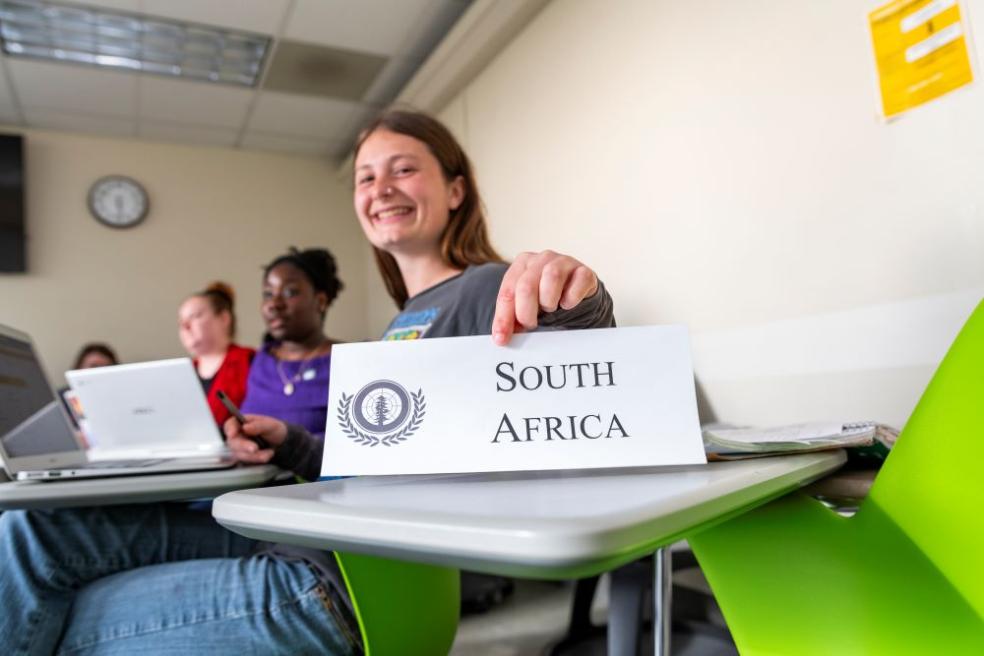
Their hard work culminated in March, when the team won an Outstanding Delegation Award, placing it in the top 20% of teams at the Model United Nations Conference in New York. It was the highest ranking a team fielded from Humboldt has ever achieved.
Model UN is a worldwide organization that sees students roleplay as delegates for nations, research and propose policy, debate, give speeches, and negotiate with each other—as the real UN does. These experiences build a variety of skills that are applicable in a wide array of fields.
Political Science Professor Noah Zerbe joined Model UN during his undergraduate studies. It was such a powerful experience, he says, that he knew he wanted to offer it to students when he was hired at Cal Poly Humboldt 20 years ago.
Each year he teaches a course that prepares students to compete in two competitions: a smaller, regional conference in San Francisco, and the national conference in New York City. The San Francisco conference acts as an introduction to competition for most students, Zerbe explains, and those with more experience attend the New York conference.
And “national” is a bit of a misnomer—the New York conference sees more than 5,000 students from around the world competing at a high level. Many of them get years of training, and get support from the diplomatic structures of their home governments.
Humboldt makes its name with a scrappier approach. Students spend the year learning the rules of Model UN debate, studying negotiation and consensus building, and researching the countries they’ve been assigned to represent. They research policies and develop resolutions and position papers based on committees that reflect their skills and interests—many students are Political Science majors but Zerbe says students from all over the University participate, for example, an Environmental Science student would be well-suited for a committee focused on climate change resilience.
They also practice public speaking, and just before this year’s competition, Zerbe gave his most dreaded annual assignment: students would give the speech they’d prepared for the conference to the class. The hard part, he explains, is that students have to watch a video of their speech and critique their own performance. “That is a much more powerful lesson than any feedback I could give them. It’s the most valuable assignment in the course.”
Amanda Vollema, a Political Science major with a minor in Philosophy, was looking for an experiential course and decided to join Model UN on a whim. “I absolutely fell in love with it,” and has met two of her best friends through the program.
At the New York conference, Vollema represented Guinea-Bissau at the UN Environment Assembly, which was focused on textile sustainability. She spent the week in the committee meeting people and working through her policy proposals. A highlight was snagging front-row seats in the UN General Assembly hall for the closing ceremony. She says she wants to remain involved with Model UN after graduation.
Vollema has a background in theater and says policy research is a natural skill for her. She praises Zerbe for preparing students for conferences but also admits that it can still be overwhelming. At last year's regional conference, she was thrown into the deep end. “It’s hard to prepare someone for their first Model UN conference—class simulations just aren’t the same. What you practice doesn’t click until you get there.”
But it does click—at conferences, Zerbe sees students’ self-underestimations melt away. “They think they’re not ready, but they get into a flow and realize they are capable of far more than they thought they were.”
The skills that Model UN develops—team building, negotiation, and public speaking—have to be applied.
“That sense of self-confidence is not something you can teach,” Zerbe says. “They have to experience it. And it's even more transformative for the students who feel unprepared.”